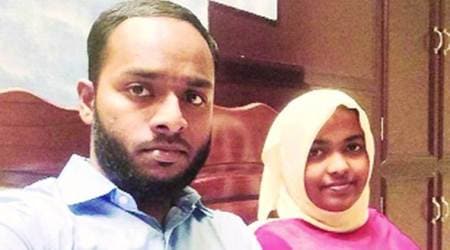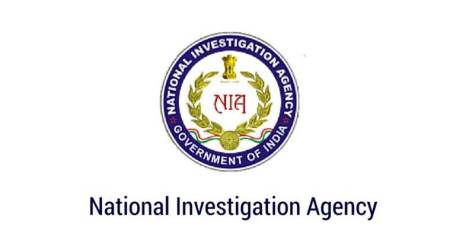 Shefin Jahan and his wife
Shefin Jahan and his wife
THE SUPREME Court on Wednesday asked the National Investigation Agency (NIA) to take over the probe into a Hindu woman’s conversion to Islam and her subsequent marriage to a Gulf returnee in Kerala after the agency said that it did not appear to be an isolated case.
According to the NIA, “two outfits whose names had cropped up in the case may have links with the banned Students Islamic Movement of India (SIMI).”
A bench of Chief Justice of India J S Khehar and Justice D Y Chandrachud asked retired Supreme Court judge R V Raveendran to monitor the investigation.
The Kerala government did not oppose the demand for NIA probe and left it to the court to take an appropriate decision.
The bench drew parallels with the controversial online game ‘Blue Whale Challenge’ to convey its apprehensions in the matter. “We hear there is a game called Blue Whale Challenge. There are things that can lead people to do anything,” CJI Khehar said while rejecting opposition to involving NIA in the case.
The court was hearing a petition filed by Kerala native Shefin Jahan, whose marriage to the woman was annulled by Kerala High Court in May this year. A Homeopathy graduate, the woman, originally named Akhila, had converted to Islam and subsequently had an “arranged marriage” with Jahan.
“It does not appear to be an isolated case,” Additional Solicitor General Maninder Singh, who appeared for NIA, told the court. He contended that the case had similarities with conversion and marriage of another Kerala woman, which is still under investigation.
The woman in that case had told the police that she was “advised to marry a Muslim to avoid any interference by court”.
Singh told the court, “The lady who takes custody (of these women) gets them married. Some of the entities also appeared to be common — the girls leave their home because of differences with parents and somebody volunteers to give them shelter. This requires investigation.”
CJI Khehar pointed out that the HC order “also mentions so (that it was not an isolated case)”.
Raising doubts on the woman’s mental state, the court wondered “why she, a Homeopathy graduate, had given three names on three different occasions”.
Senior counsel Kapil Sibal, who appeared for Jahan, opposed the demand for NIA probe and said that the state police’s Crime Branch investigation was still incomplete.
In reply, the CJI said, “This is an incident pertaining to Kerala. There are some very serious remarks made by the High Court. Today you say Crime Branch probe is not over. Why not?”
Sibal, assisted by senior counsel Indira Jaising, insisted that the court should meet the woman and interview her. But the court replied that the HC had already interviewed her. When Sibal pointed out that the HC interview was a long time ago, Justice Chandrachud said a lot of events had taken place since then.
The court took exception to contentions that it was prejudging the case. It said, “We want all sides to have equal opportunity…we want to take any decision only after all inputs come. We are not prejudging. You are being unfair.”
The court said that it will meet the woman at a later stage before arriving at any final decision.
Rs 1 lakh fee, Rs 2 lakh for travel expense
The Supreme Court on Wednesday said its former judge Justice R V Raveendran, under whose guidance the NIA would probe a controversial case of annulment of a marriage in Kerala, would be paid by the Centre a consolidated fee of Rs 1 lakh, besides Rs 2 lakh per day for travelling outside Bengaluru.
The bench of Chief Justice J S Khehar and Justice D Y Chandrachud said the Centre would reimburse the expenses to Justice (Retd) Raveendran within two weeks from the date of submission of bills by him. “The Government of India shall reimburse the same… within two weeks from the date of submission of the bills,” it said.

